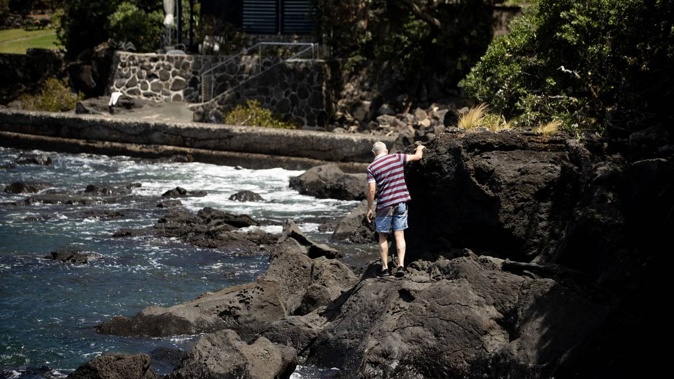
Auckland walkers are reportedly suffering broken bones and concussions trying to cross slippery rocks after part of an “iconic” coastal walkway closed because of a heritage battle involving the city’s council.
The 2.5-kilometre Takapuna to Milford coastal walkway is used by tens of thousands of Aucklanders each year. However, private landowners have recently closed public access to a popular section due to a dispute over a seaside cottage.
That has led increasing numbers of walkers to try shortcuts across wet rocks rather than make a longer detour away from the coast.
After a series of injuries, one walker has now sent a written complaint to an Auckland councillor about the dangers and difficulties emergency services face in reaching those who are hurt, while another has handwritten warnings on signs, saying the rock section is too dangerous.
“At low tide, don’t attempt the rocks. Super slippery rocks = injurys [sic], broken wrist ... signed, a victim,” the person wrote.
The landowners and Auckland Council say they sympathise with the injured and don’t want anyone to get hurt.
Yet the issue doesn’t appear set for a speedy resolution.
/cloudfront-ap-southeast-2.images.arcpublishing.com/nzme/UUHVNGE5YFEXXEVUMA3CQAEZTE.JPG)
Former waterfront landowner Paul Firth opened his land free of charge to walkers in 2011 after a public bridge on rocks in front of his property washed away. He then spent his own money maintaining the path.
But with Firth having died, the family now want to give a waterfront slice of their land to Auckland Council to be permanently used as part of the walkway, on the condition that the council removes a 2013 heritage listing on their cottage and grants them relief on $78,000 in unpaid rates.
They believe the heritage listing was “unfairly” placed on the property because they weren’t consulted about it and because the value lies more in the life of former photographer resident Clifton Firth than in the cottage itself.
Lawyer Alex Witten-Hannah, acting for the family, said the heritage listing greatly reduced the property’s potential sale price, given the council had valued the cottage at just $50,000 while its prime waterfront land has a $6.8 million CV.
The rustic cottage is surrounded by some of Auckland’s most desirable waterfront homes, including a four-storey mansion next door with a $13m CV.
Witten-Hannah said he would have expected the council to jump at the opportunity to get “iconic” land cheaply for future generations but that the council had been operating at a “snail’s pace” because of “bureaucratic nonsense”.
Recently, the Takapuna Residents’ Association presented a petition with 7000 signatures to Auckland Mayor Wayne Brown, calling on him to “get on and do something” about the issue, given the walkway washed away 12 years ago.
The planning, environment and parks committee has subsequently asked council staff to explore all possible legal options and present them at a meeting on November 30.
/cloudfront-ap-southeast-2.images.arcpublishing.com/nzme/5EDU6Q5O7NHFXDRGET7H672SC4.JPG)
However, committee chairman and councillor Richard Hills said there did not yet appear to be a straightforward answer.
The council could potentially put in a plan change application to explore whether the heritage listing could be removed. But that could cost $100,000 at a time when it was facing a huge budget hole, and it carried no guarantee of success.
The committee assessing the heritage value was independent, he said. The council had no legal power to force it to make a decision and the facts that led to the property being listed in the first place had not changed.
Even building a new public bridge was not straightforward, because the old one had been built on private land, meaning the council needed permission to build.
Hills also said the walkway passed through the land of 72 private owners, raising questions that, if the council negotiated with the Firths, it could expose it to other negotiations.
“Most people are shocked so much of this goes over private land. I think most people would just assume that the beach was for everyone.”
Still, while it had been “extremely frustrating” trying to find a solution, Hills agreed with the Firth family that the walkway was special.
“We all support access to the walkway, it’s such an important feature, but the issue is it covers lots of private properties in this way.”
Take your Radio, Podcasts and Music with you









